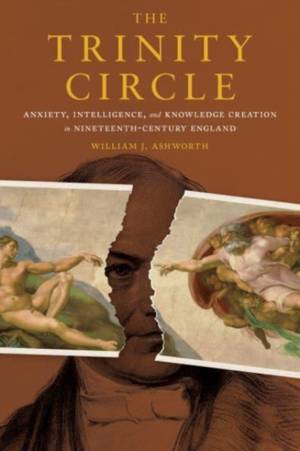
- Afhalen na 1 uur in een winkel met voorraad
- Gratis thuislevering in België vanaf € 30
- Ruim aanbod met 7 miljoen producten
- Afhalen na 1 uur in een winkel met voorraad
- Gratis thuislevering in België vanaf € 30
- Ruim aanbod met 7 miljoen producten
Zoeken
The Trinity Circle
Anxiety, Intelligence, and Knowledge Creation in Nineteenth-Century England
William J Ashworth
€ 91,95
+ 183 punten
Omschrijving
The Trinity Circle explores the creation of knowledge in nineteenth-century England, when any notion of a recognizably modern science was still nearly a century off, religion still infused all ways of elite knowing, and even those who denied its relevance had to work extremely hard to do so. The rise of capitalism during this period--embodied by secular faith, political radicalism, science, commerce, and industry--was, according to Anglican critics, undermining this spiritual world and challenging it with a superficial material one: a human-centric rationalist society hell-bent on measurable betterment via profit, consumption, and a prevalent notion of progress. Here, William J. Ashworth places the politics of science within a far more contested context. By focusing on the Trinity College circle, spearheaded from Cambridge by the polymath William Whewell, he details an ongoing struggle between the Established Church and a quest for change to the prevailing social hierarchy. His study presents a far from unified view of science and religion at a time when new ways of thinking threatened to divide England and even the Trinity College itself.
Specificaties
Betrokkenen
- Auteur(s):
- Uitgeverij:
Inhoud
- Aantal bladzijden:
- 312
- Taal:
- Engels
- Reeks:
Eigenschappen
- Productcode (EAN):
- 9780822946878
- Verschijningsdatum:
- 17/08/2021
- Uitvoering:
- Hardcover
- Formaat:
- Genaaid
- Afmetingen:
- 152 mm x 231 mm
- Gewicht:
- 544 g

Alleen bij Standaard Boekhandel
+ 183 punten op je klantenkaart van Standaard Boekhandel
Beoordelingen
We publiceren alleen reviews die voldoen aan de voorwaarden voor reviews. Bekijk onze voorwaarden voor reviews.











